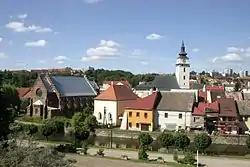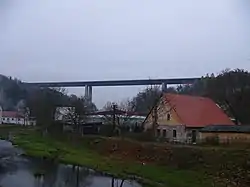Velké Meziříčí
Velké Meziříčí (Czech pronunciation: [ˈvɛlkɛː ˈmɛzɪr̝iːtʃiː]; German: Groß Meseritsch) is a town in the Vysočina Region, Czech Republic. It is situated under the original Gothic castle in a valley framed by the hills of the Bohemian-Moravian Highlands. It has a population of about 11,500.
Velké Meziříčí | |
|---|---|
Town | |
 Centre of the town from north | |
 Flag  Coat of arms | |
| Etymology: "Large town between the rivers" | |
| Nickname(s): Velmez | |
 Velké Meziříčí Location in the Czech Republic | |
| Coordinates: 49°21′13″N 16°0′48″E | |
| Country | |
| Region | Vysočina |
| District | Žďár nad Sázavou |
| First mentioned | 1236 |
| Town privileges | 1408 |
| Government | |
| • Mayor | Alexandros Kaminaras |
| Area | |
| • Total | 40.66 km2 (15.70 sq mi) |
| Elevation | 425 m (1,394 ft) |
| Population (2020-01-01[1]) | |
| • Total | 11,498 |
| • Density | 280/km2 (730/sq mi) |
| Time zone | UTC+1 (CET) |
| • Summer (DST) | UTC+2 (CEST) |
| Postal code | 594 01 to 594 41 |
| Website | www.velkemezirici.cz |
It is situated on the confluence of the Oslava and Balinka rivers near the D1 motorway with the Vysočina Bridge.
History
The first written records of the town come from the 13th century. The settlement obtained full town privileges in 1408 – the celebrations of the 600th anniversary of this event took place in 2008, including the publishing of a representative book; the rights were approved by the king of Bohemia Wenceslaus IV in 1417. The historical centre was designated as conserved zone of sights where the castle (formerly a stronghold from the 12th century, which is very well preserved, and hosts, among other, The Museum of Roads and Highways), the Gothic St. Nicolas Church, an originally Gothic City Hall, the Renaissance Lutheran Grammar School, two Jewish Synagogues and partly preserved city walls with a gate are the most significant buildings. An independent Jewish community had been living in the city since the 17th century – a well-preserved Jewish graveyard with Baroque tombstones comes from the 17th century.
Until 1918, Groß Meseritsch – Velké Meziříčí (German name only before 1867) was part of the Austrian monarchy (Austria side after the compromise of 1867), head of the district with the same name, one of the 34 Bezirkshauptmannschaften in Moravia.[2]
Notable people
- Tzvi Ashkenazi (1656–1718) Jewish scholar, rabbi of Amsterdam
- Isaac Hirsch Weiss (1815–1905), literature historian
- Ludwig Minkus (1826–1917), Jewish-Austrian composer of ballet music, a violin virtuoso and teacher
- Nathan Weiss (1851–1883), Austrian physician and neurologist
- Arnold Pick (1851–1924), psychiatrist
- Leopold Hilsner (1876–1928), Jewish man who became a victim of the false charge & pogrom
- Stanislav Vodička (1910–1982), writer
Twin towns – sister cities
Velké Meziříčí is twinned with:[3]
 České Meziříčí, Czech Republic
České Meziříčí, Czech Republic Tisno, Croatia
Tisno, Croatia Valašské Meziříčí, Czech Republic
Valašské Meziříčí, Czech Republic Vansbro, Sweden
Vansbro, Sweden
Gallery
 St. Nicolaus Church, the tower
St. Nicolaus Church, the tower The castle, main gate
The castle, main gate The Vysočina Bridge
The Vysočina Bridge The castle, aerial view
The castle, aerial view Aerial view
Aerial view
References
- "Population of Municipalities – 1 January 2020". Czech Statistical Office. 2020-04-30.
- Die postalischen Abstempelungen auf den österreichischen Postwertzeichen-Ausgaben 1867, 1883 und 1890, Wilhelm KLEIN, 1967
- "Partnerská města". velkemezirici.cz (in Czech). Město Velké Meziříčí. Retrieved 2020-07-22.